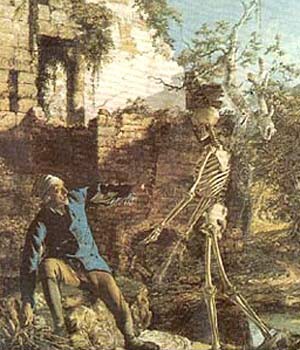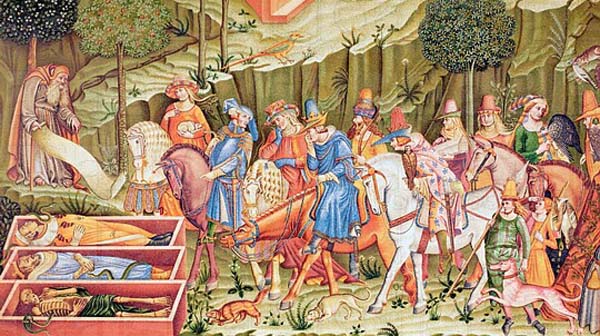 |
Catholic Customs
My Encounter with Alphonsus de Liguori
Michael Saint Amand
I just recently attended a memorial service for a friend who passed away at age 55. He and I had first met in junior high school and spent those early years playing basketball together. We had lost touch for many years as so many do being caught up in our own lives with families and careers. We were the same age and his death made me really begin to reflect on my own life. I had just retired two days prior from a 25-year job and there I was, already spending my second day of retirement going to a funeral for an old friend. It really began to make me ponder: “Am I ready to die?”

Death arrives when one least expects it... |
Like everybody, I have always known that I would die some day, but his sudden passing away caught me by surprise because he was my age and “so young,” I thought.
My first reaction, a bit materialistic I must confess, was “Yes! I am prepared, I have established a will, I even have a living trust already completed in case of that unfortunate day should fall to me. I put aside enough means for my wife to live comfortably for the rest of her life and for my children to receive a good education. My wife and I even have our burial plot. So, it seemed that everything necessary had been taken care of.”
Call it a coincidence, call it Divine Providence, call it what you will, but I had just begun to read a book titled Preparation for Death by St. Alphonsus Maria de Liguori, founder of the Redemptorists. A friend had mentioned this book to me about six months earlier, and after Mass one Sunday I saw the book on the church bookstore shelf and picked it up for eighteen dollars (the best eighteen dollars I ever spent).
The timing of reading this book, my retirement and the death of a friend seemed to tie together immediately. As I began to read this book, the honest answer to my question “Am I ready to die?” changed to: “No! I am not prepared.” I had spent a lifetime working, saving, planning for my retirement, but so little time on considering the eternal destiny of my soul, a point so eloquently pointed out to me by St. Alphonsus when he says, “Perhaps, with its cares and pleasures, the world is occupying too large a portion of our time and thoughts.” (p. 7)
I was raised in the post-conciliar Church and I vaguely remember having heard of the last four things: Death, Judgment Heaven and Hell.
But as I read deeper into St. Alphonsus’ work, I found he was very clear on the Last Four Things, especially death. It seemed to me that today’s theology reminds us only of heaven, forgetting the other truths death, judgment and hell.
Reading this book, I could clearly see the damage I have done to both myself and others as well and, most important, the damage and offense I have committed against Our Lord. I could only respond with mea culpa, mea culpa, mea maxima culpa… It would seem that I really had not pondered too long or too hard on death, as St. Alphonsus explained to me.
He warned me “It is foolish, indeed, not to wish to think upon death, which is absolutely certain, and on which eternity depends; but it is greater folly to think upon it, and not prepare for it.” (p. 86)
I am afraid I have lived my life imagining that I will be here tomorrow, and have plenty of time to amend. How dangerous this is for my soul. How many times have I seen or heard it said that this or that person “was taken before his time.” Or, “how tragic he or she was taken so suddenly” and “at such a young age.” Were they prepared for death? Had anyone ever talked to them about the importance of death?
What a gift I received from someone who thought it so important to recommend this Saint and his teachings to me! What a benefit to have death and its effects explained to me as no one has ever explained them to me before! Now I understand the real significance of that phrase of the liturgy of Ash Wednesday: Memento homo quia pulvis est and in pulverem reverteris,“Remember, man, that thou art dust, and to dust thou shalt return.”
I highly recommend this book to you in the spirit of charity that it was recommended to me. In truth, I might repeat the words of one of St. Alphonsus’ meditations at the end of his work: “ I was lost … It was Thy goodness alone which led me back to my present condition, and I hope to continue in Thy grace” ( p. 352)
This might just be the book for your consideration as Lent approaches.
Deo Gratias.

The Triumph of Death: a worldly hunting party comes on three open coffins, with the message,
"What you are, we were. What we are, you will be." |

Posted February 3, 2012

Related Topics of Interest
 Progressivist Concepts of Heaven, Hell & Purgatory Progressivist Concepts of Heaven, Hell & Purgatory
 Hell: A Demand of Divine Goodness Hell: A Demand of Divine Goodness
 Meditation on Hell Meditation on Hell
 Letter from Beyond Proves Existence of Hell Letter from Beyond Proves Existence of Hell
 The Sudden and Unprovided Death The Sudden and Unprovided Death
 The Sniper and the Novissima The Sniper and the Novissima

| Related Works of Interest
|
Catholic Customs | Religious | Home | Books | CDs | Search | Contact Us | Donate

© 2002- Tradition in Action, Inc. All Rights Reserved
|
 |
|